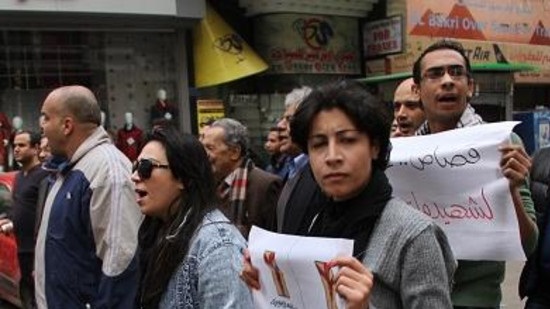Relatives and advocates of slain protester Shaimaa El-Sabbagh have called for solidarity as the retrial of the police officer accused of killing her gets underway, and expressed concerns about his conduct in court.
El-Sabbagh was shot dead when a peaceful demonstration in central Cairo was dispersed by police in January last year.
The march was organised by Egypt’s Socialist Popular Alliance Party, of which El-Sabbagh was a member, on 24 January, to mark the fourth anniversary of the revolution.
The 32-year-old poet and activist died after being hit by birdshot fired by the interior ministry’s central security forces (CSF).
In June 2015, a Cairo court sentenced CSF officer Yaseen Hatem to 15 years in jail for "wounding that led to the death" of the mother of one, as well as "deliberately wounding" other protesters.
However, on 14 February this year, the Court of Cassation overturned the sentence and ordered Hatem be retried.
On Sunday, the second session in Hatem's retrial will be held in the South Cairo Criminal Court.
Ali Soliman, one of the lawyers advocating for El-Sabbagh in the case, told Ahram Online that the first session in the retrial was held in mid-October, but did not receive any media attention, which he said was vital to this case.
The socialist party and the victim's family called last week for an online solidarity campaign with El-Sabbagh under the hashtag "retribution for Shaimaa El-Sabbagh." The call was taken up by some on social media.
"The defendant’s lawyers are attempting to question the evidence of the case, which is why they asked for eyewitnesses to be re-heard, to hold a new discussion with the medical examiner, and to re-watch the videos in the next session,” Soliman said.
“This is all in an attempt to decrease the sentence to three to seven years through a claim of unintentional murder," Soliman added.
In February 2015, President Abdel-Fattah El-Sisi asked the interior minister to investigate the case publicly and transparently. El-Sisi described El-Sabbagh as "my daughter," adding that an individual's mistake does not make the entire institution responsible.
The initial court verdict against the CSF officer was deemed the toughest such sentence against a policeman for killing protesters since the 2011 uprising.
"We proved before that the crime was intentional, from a very close range, eight metres away, which is a killing space; the court convicted the defendant to 15 years because of this," said Soliman.
"The defendant is still convicted even though he was released by the Court of Cassation, but in the last session, he came to court with his gun, which was very provocative and scary for El-Sabbagh’s family,” he added.
The policeman's lawyer, Fareed El-Deeb, said in the court session in February that the march where El-Sabbagh was killed took place under “exceptional circumstances” due to the timing of the anniversary, adding that if his client had an intention to commit murder, dozens of casualties would have occurred.
Osama El-Sehly, husband of the slain activist, told Ahram Online that he has chosen not to attend the retrial.
"I do not trust that the defendant will stay convicted, because many police officers who were involved in murdering protesters were not convicted. But the evidence in Shaimaa's case is very clear… and it was also clear that she was peaceful. She is a mother who was holding flowers," El-Sehly said.




